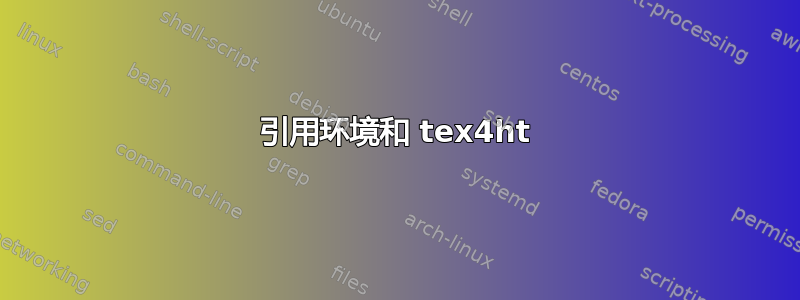
我正在尝试转换一些包含引用环境,使用 html乳胶。这里有一个小例子,其排版没有任何问题:
\documentclass{scrbook}
\usepackage{quoting}
\begin{document}
\chapter{Chapter one}
Here is a para
Here is a second para
\begin{quoting}
one para inside a small block.
another para inside the block.
\end{quoting}
Now for a para after the quote.
And another para after the quote.
What has happened? In the HTML version there are no para breaks!
\chapter{Chapter two}
Let's try after a chapter break.
That's good -- para breaks work now.
But what happened after the quoting environment in the previous chapter?
\end{document}
当我尝试在这个文件上运行 htlatex 时,它不知道引用环境,所以我创建了这个 tex4ht 配置文件配置示例.cfg:
\Preamble{html}
\begin{document}
\ConfigureEnv{quoting}
{\HCode{<blockquote>}}
{\HCode{</blockquote>}}{}{}
\EndPreamble
运行这个程序似乎htlatex example.tex "configexample.cfg"有效,并且它创建例子.html,甚至在其中获得了 blockquote 标签。但是在引用环境结束后,我没有得到我期望的 p 标签。也就是说,直到章节中断之后才得到。
我不知道这是 tex4ht 的问题,还是引用包。我可以回到使用引用环境,但如果可以的话,我想先让它工作。有什么想法吗?
(在 MiKTeX 下运行)
答案1
好的,看起来这quoting非常积极地重新定义了\everypar用于tex4ht插入<p>标签的令牌寄存器。因此,我们必须创建quoting.4ht将自动加载的文件quoting.sty:
\newtoks\quoting@parht
\NewConfigure{quoting}{2}
\Configure{quoting}
{\ifvmode \IgnorePar\fi \EndP\HCode{<blockquote>}\HtmlParOn}
{\ifvmode \IgnorePar\fi \EndP\HCode{</blockquote>}\HtmlParOn\par}
\ConfigureEnv{quoting}
{\quoting@parht=\everypar%
\a:quoting\par\ShowPar}
{\par%
\b:quoting%
\everypar=\quoting@parht\par\ShowPar}
{}{}
\ConfigureList{quoting}{}{}
{%
\everypar=\quoting@parht\par\ShowPar%
}{}
首先,我们定义新的令牌寄存器quoting@parht,其中\everypar保存了的值,然后quoting创建新的配置,因此我们可以仅配置要插入的标签。
然后\ConfigureEnv我们用 保存 的值\everypar,然后插入开始和结束标记,并恢复 的值everypar,这样 html 段落就会被打印出来。我们还必须使用\ConfigureList,这样段落在环境中也能正常工作。结果:
<?xml version="1.0" encoding="iso-8859-1" ?>
<!DOCTYPE html PUBLIC "-//W3C//DTD XHTML 1.0 Transitional//EN"
"http://www.w3.org/TR/xhtml1/DTD/xhtml1-transitional.dtd">
<!--http://www.w3.org/TR/xhtml1/DTD/xhtml1-transitional.dtd-->
<html xmlns="http://www.w3.org/1999/xhtml"
>
<head><title></title>
<meta http-equiv="Content-Type" content="text/html; charset=iso-8859-1" />
<meta name="generator" content="TeX4ht (http://www.cse.ohio-state.edu/~gurari/TeX4ht/)" />
<meta name="originator" content="TeX4ht (http://www.cse.ohio-state.edu/~gurari/TeX4ht/)" />
<!-- xhtml,html -->
<meta name="src" content="quot.tex" />
<meta name="date" content="2013-10-29 15:45:00" />
<link rel="stylesheet" type="text/css" href="quot.css" />
</head><body
>
<h2 class="chapterHead"><span class="titlemark">1</span>  <a
id="x1-10001"></a>Chapter one</h2>
<!--l. 6--><p class="noindent" >Here is a para
</p><!--l. 8--><p class="indent" > Here is a second para
</p>
<blockquote>
<!--l. 11--><p class="indent" >
one para inside a small block.
</p><!--l. 13--><p class="indent" > another para inside the block.
</p><!--l. 15--><p class="indent" > and another para
</p>
</blockquote>
<!--l. 18--><p class="indent" > Now for a para after the quote.
</p><!--l. 20--><p class="indent" > And another para after the quote.
</p><!--l. 22--><p class="indent" > What has happened? In the HTML version there are no para breaks!
</p>
<h2 class="chapterHead"><span class="titlemark">2</span>  <a
id="x1-20002"></a>Chapter two</h2>
<!--l. 25--><p class="noindent" >Let's try after a chapter break.
</p><!--l. 27--><p class="indent" > That's good – para breaks work now.
</p><!--l. 29--><p class="indent" > But what happened after the quoting environment in the previous chapter? </p>
</body></html>


